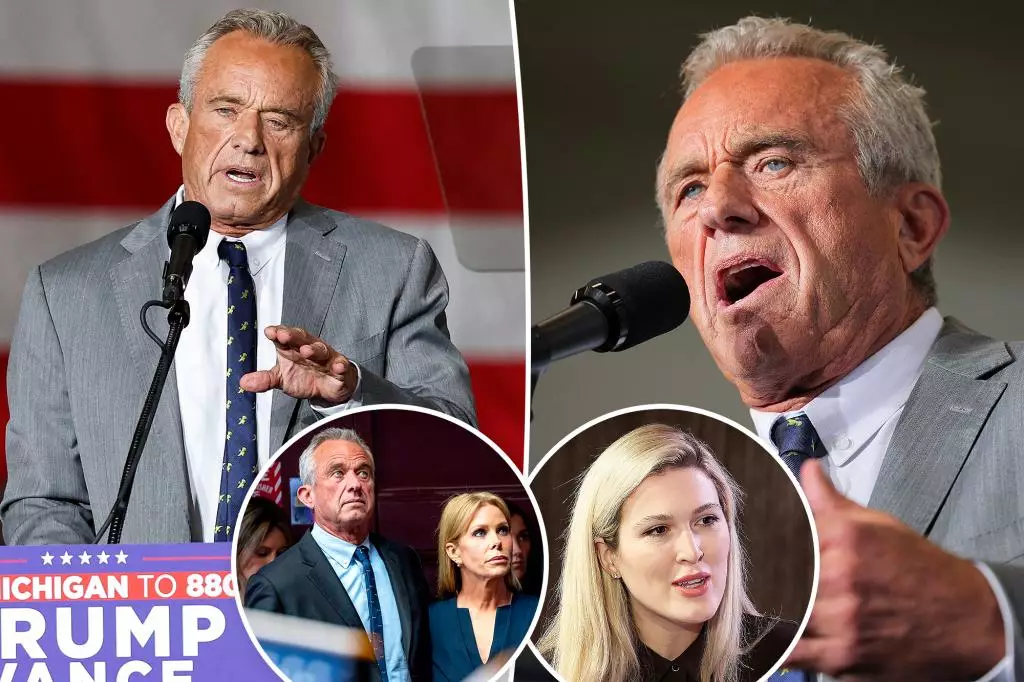In the realm of public life, few individuals understand the delicate balance between private and public personas as vividly as political figures. Robert F. Kennedy Jr., a well-known environmental attorney and activist, now finds himself juggling the weight of personal controversy while aiming to position himself as a prominent voice in public health discussions. Recently, he faced scrutiny due to allegations of a sexting scandal involving New York Magazine writer Olivia Nuzzi. Despite this tumultuous backdrop, he presented himself with apparent ease at a Senate roundtable focused on nutrition, demonstrating the often absurd juxtaposition of political life where scandals and advocacy can coexist.
Even amid personal turmoil, Kennedy’s appearance at the roundtable discussion in Washington D.C. painted the picture of a composed and engaged individual. He shared the stage with notable figures such as Jillian Michaels and Dr. Jordan B. Peterson, which positioned him within a panel that demanded serious engagement with pressing health issues. Yet whispers of his private life echoed during his public outing, leaving spectators to question whether he could genuinely contribute to discussions about health while mired in controversy. His decision to don his wedding ring against this backdrop raises eyebrows; is it a sign of loyalty or simply a tactic for image management?
In the discussion titled “American Health and Nutrition: A Second Opinion,” held under the auspices of Senator Ron Johnson, participants critiqued the close ties between corporate power and public health directives. This candid approach to tackling the food industry’s influence on regulatory practices underscored the dark symbiosis between government and commercial interests. Kennedy’s engagement in such discussions has been longstanding, but the personal controversies surrounding him beg the question: can he effectively critique the system when he himself is ensnared in its complexities?
Kennedy’s advocacy against ultra-processed foods and toxic chemicals paints him as a champion of public health. He has boldly criticized government agencies, claiming they are compromised and fail to safeguard the well-being of the American populace. In a recent interview with Fox News, highlighting the flaws in the food supply, he declared that consumers can’t rely on ingredient labels due to pervasive governmental corruption. His statements invite admiration for his willingness to challenge powerful entities; however, they also provoke skepticism. Does Kennedy possess the credibility to criticize corruption while facing allegations of his own?
The intensity of his commentary turns back on itself when the personal and professional spheres intersect. After publicly aligning himself with Donald Trump post-campaign suspension, he proclaimed, “Don’t you want a president that’s going to make America healthy again?” This rhetorical flourish echoed powerfully, yet it is undermined by the ongoing scrutiny of his private choices. Critics might view Kennedy’s potential cabinet position under a Trump administration as a glaring contradiction given his current controversies.
Ultimately, the fascination with Kennedy’s narrative lies in the broader question of integrity in public advocacy. While he aims to illuminate issues surrounding American health, the dissonance between his public conduct and private alleged failings presents a unique challenge. His unwillingness to address his personal scandal when prompted only deepens this disconnect. “I don’t make comments on it,” Kennedy stated, elegantly dodging the personal inquiry but suggesting an awareness of the vital need to maintain focus on his health messages.
For many observers, this incident exemplifies a larger issue pervading political discourse: the struggle between authentic communication and political strategy. Can Kennedy bridge the chasm between addressing the health challenges facing America while managing the implications of personal scandal effectively? This ongoing balancing act serves as a reminder that in public life, maintaining integrity is as complex as the issues one advocates for—a reality that Robert F. Kennedy Jr. is currently navigating with varied success.
